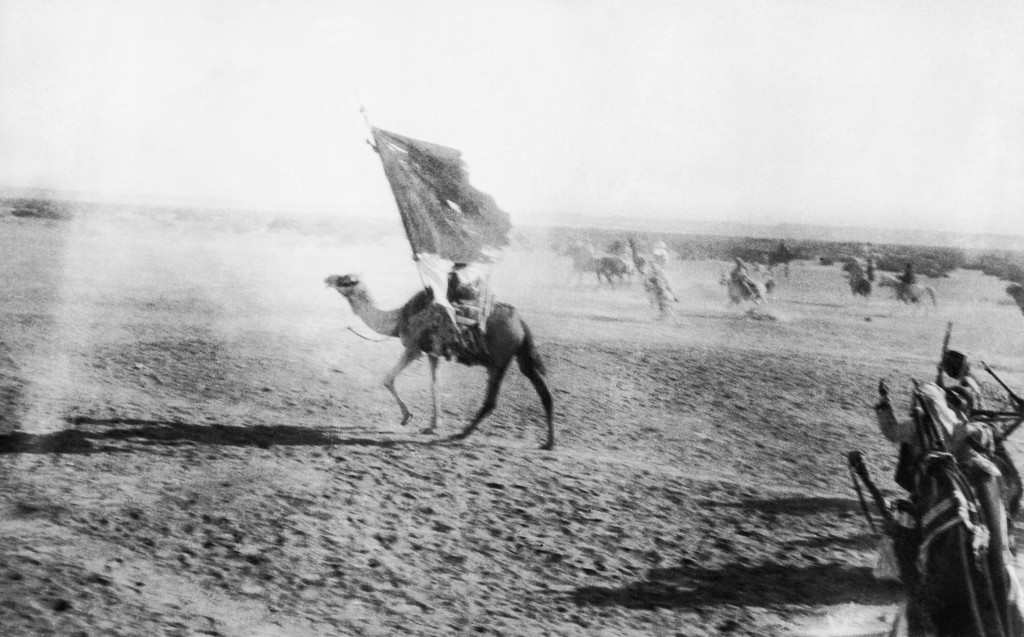
The Arab Revolt
The aim of The Arab Revolt (1916-1918) was to secure independence from the ruling Ottoman Turks and create a single unified Arab state spanning from Aleppo in Syria to Aden in Yemen.
The allocation of land to the Arabs indicated in the Hussein-McMahon Correspondence (a six-month exchange of letters pledging British support to the Hashimite leader, Sharif of Mecca) was contradicted by the Sykes-Picot agreement, a secret understanding concluded in May 1916 between Britain and France, with the assent of Russia, for the division of a defeated Ottoman Empire after the war. Further complicating the issue was the Balfour Declaration of 1917, which appeared to promise support for a Jewish national home in Palestine. The legacy of the Arab Revolt illustrates the instability that arises when colonial outsiders attempt to create artificial borders and states.
As part of Bristol800 in 2016, we marked the centenary by looking at the Middle East 100 years ago; the role, character and myth of T E Lawrence – the British officer most associated with the revolt; and how the events of 1916 created a legacy evident in the Middle East of today.
In addition to screening David Lean’s film classic Lawrence of Arabia, we also showed Theeb, a Jordanian film set in the Ottoman province of Hijaz during World War I: a young Bedouin boy experiences a greatly hastened coming-of-age as he embarks on a perilous desert journey to guide a British officer to his secret destination.
Between the films, a panel of distinguished historians look at the Middle East then and now. The panellists were: Leila Al-Shami, founding member of Tahrir-ICN; Neil Faulkner, co-director the Great Arab Revolt Project in Jordan (2006-2014) and author of Lawrence of Arabia’s War: The Arabs, the British and the Remaking of the Middle East in WW1; Eugene Rogan, director of the Middle East Centre at St Antony’s College, University of Oxford and author of The Fall of the Ottomans: The Great War in the Middle East, 1914-1920; Avi Shlaim, author of The Iron Wall: Israel and the Arab World and Israel and Palestine: Reappraisals, Revisions, Refutations; and Robin Yassin-Kassab novelist, co-author, with Al-Shami, of Burning Country: Syrians in Revolution and War.
In addition Christopher Frayling talked about how the legend of Lawrence was created by the American journalist Lowell Thomas and showed film extracts from Lowell’s presentations – With Allenby in Palestine and Lawrence in Arabia – which took place after the war and were seen by four million people worldwide. Lawrence hated the show, calling Thomas a vulgar man, but saw it several times.
The day was part of Shared Spaces Festival which took place across Bristol from Thursday 19 May to Friday 3 July 2016 with a unique programme of visual art, performance and interaction. Shared Spaces centred around an exhibition of contemporary art by British Muslim and Jewish artists. Some explored religious and cultural tradition, others touched on stories of lives and cultures left behind, contemporary identities, our connectedness with ourselves, our communities and our wider world. It included work from artists with a rich heritage of geometric design and calligraphy, common to both Islamic and Judaic art, delicately interwoven with personal expression and a commissioned collaboration between artist Tom Berry and poet Shagufta K.
In addition, an exhibition hosted by Bristol Central Library (Thursday 19 May – Friday 27 June 2016) showed treasures from the library collection, including seventeenth and eighteenth century prayer books, and drew on rare and significant documents from the Bristol Record Office. The archival material was accompanied by contemporary artistic responses. With a timeline extending from a 1790 plan for a ‘Jews churchyard’ to the current Islamic fayre, the exhibition illustrated the rich history of the Muslim and Jewish communities in Bristol and explored how these immigrant communities have shaped and enriched the city. It also looked at the role Bristol has played in aiding refugees and fighting for racial equality, providing glimpses into the lives of Jewish refugees in the 1940s, and Muslim refugees and migrants today.
Shared Spaces launched with a special event on Wed 25 May 2016 that brought together Muslim and Jewish poets and musicians from across Bristol and the UK. Poetry from T S Eliot prize winner George Szirtes, Shazea Qurahsai, Shagufta K, Elizabeth Gold, Lisa Saffron and Hafsah Aneela Bashir. Music from Mark Smulian and Amadou Diagne. The evening included tea, coffee and sweet delicacies from the Middle East.
The festival was in association with Salaam Shalom. Founded in 2006, Salaam Shalom aims to build bridges between communities, particularly Muslim and Jewish communities in the UK; prevent conflict and discrimination between minority and marginalised groups; use media and the arts as a tool for positive social change; and help create a more tolerant, socially cohesive society.